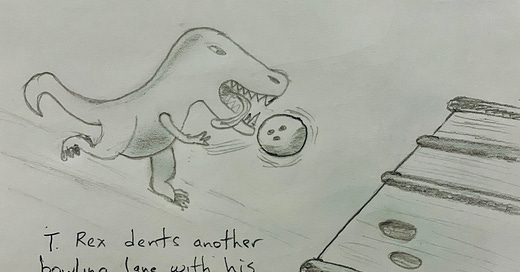
Sharing the Mental Load
At some point in the past decade, I read an eye-opening article about how mental load, the invisible labor involved in handling a household and family, is usually carried by women. It suggested that for those of us without it, mental load is the water we swim in, unseen and natural, the actions helping the household hum along without a hitch.
My initial reaction was, “That's not MY situation. I love my wife and value her time the same as mine. I’m a woke-ass 21st Century Man! I read Brené Brown!”
How wrong I was.
Looking at my to-do list versus Chelsea's simply astounded me. Mine was simple; hers ranged from shopping lists and thinking about Christmas cards and gifts to cleaning the house and writing departure checklists prior to trips. The sheer quantity of things on her mind scorched my brain. (It still does.)
I won't describe mental load further: this brilliant cartoon does it perfectly.
Taking the Red Pill
In the classic movie The Matrix, Neo is offered The Red Pill, a dose of unalloyed truth that exposes reality. It ain’t pretty.
Realizing I was swimming in the water of Chelsea’s mental load was my Red Pill. Luckily, I immediately understood that and jumped right in to help.
NOT. My first reaction was defensive and bristly, pointing out allll the things I helped with. “I take out the trash, I fix stuff, I… ummm.”
Like many men, I overestimated my contribution and it took many conversations and personal honesty to scale that wall and see the truth behind it: I had gotten lazy and accustomed to the comfort created by someone else.
Sure, I’d created a business that supported us. I worked out and DID stuff, but I did it all outside the house. At home, I was actually quite useless. Sure, I’d install a bookshelf or change a bike tire, but Chelsea contributed far more in terms of who did most of the necessary house chores.
No surprise that I had this mindset. Looking back, I noticed this widely accepted uneven task distribution everywhere: in the books we read, the popular culture references we absorb. For me, it was even present in my grandparents’ relationship as my grandma served my grandpa hand and foot as he read the newspaper.
This isn’t medieval times: we Westerners are in relationships built around love, not the need to heal a political rift with a neighboring kingdom. If I valued Chelsea’s life energy equal to mine, things needed to change.
Don’t Ask “How Can I Help?”
Surprisingly, asking “How can I help?” without offering suggestions didn't actually help. It simply made me an unpaid, unskilled intern wandering around asking for projects. This made everything harder on Chelsea, who had to spend MORE time on each task because she had to talk me through it. It wasn’t even worth having the free labor!
I'd joke about being terrible at doing dishes/cleaning/cooking, but I was dodging the simple reality that I wasn't willing to carry my weight or put in the time to learn simple, useful tasks.
Now I can see why some women throw up their hands in frustration and let their partners sit around and be served. Learning is messy and slow and watching ineptness is difficult to stomach.
Instead of asking, “How can I help?” start by paying attention. The best interns observe, learn about their field via research and talking to employees, and then show up with a list of ideas for how they can contribute. They see a pain point, then ask if addressing that might be useful. The same applies on the home front.
People currently carrying the mental load, take note: your partner is going to fail miserably at things. They're going to make the kitchen look like a Jackson Pollock painting when washing the dishes and wander around grocery stores like a poorly-programmed robot when they first start doing their share of the shopping.
Although you’ll be justified in a few exasperated sighs and an occasional “I'll just do it, get outta here,” your help and patience will maintain enthusiasm during their learning process.
It certainly did to me. With Chelsea's help—and lots of patience—I expanded my skills. I noticed things the house needed, started refilling toilet paper when it ran out. I made bad meals, bought the wrong kind of broth at the store, and did a terrible job cleaning our bathrooms.
But I improved!
Fundamental Levels of Adulting
At some point, our mommies stop wiping our butts. We get jobs and pay our own car insurance, but somehow some of us forget there are other understated skills involved in adulting, skills that make us more independent.
Part of my transition to adulthood, the one I didn’t think I needed, consisted of learning how to shop and cook for myself and how to be totally fine if Chelsea had a family emergency across the country. (Without her needing to leave me food in the fridge.)
I’ve been contributing much more. From adding household staples to Anylist and throwing sheets in the laundry to handling food shopping and cooking more, I try to anticipate household needs. I even clean bathrooms, and they don’t need to be (re)cleaned after me!
I made mistakes and asked Chelsea a lot of questions early on—especially in the kitchen—but now I can hold my own.
I’ve learned that household tasks are skills, not just demeaning labor that’s below me. My appreciation deepens when I spend the time and effort on them. Especially cooking! These days, I can host a four-course dinner party for six and all Chelsea has to do is set the table and prep some beautiful flower arrangements.
It's empowering! Now I’m oh-so aware of the imbalance I see in relationships around me, which makes me admire my male friends who are bucking the trend and cooking, handling childcare, and contributing in other ways.
Of course, anyone not experiencing mental load wants to maintain their kingly status, whether mindfully or without thinking. Hot meals, a clean house and not worrying about life logistics? Sign me up. Wars are fought over maintaining power and the status quo.
Do I prefer cleaning bathrooms to playing piano or going for a bike ride? Not a chance.
Still, if we value our partners and want to support their best, most-fulfilled life, we owe it to them to step up to the plate and swing at some curveballs, even if we whiff at first.
The Benefits of Sharing the Mental Load
It’s easy to think, “oh, that’s beneath me…” But someone in your house is doing that work, and you’re choosing to be in a romantic relationship with that person.
Why is your time worth more than theirs, regardless if you earn more or do “more important” work with your time. An hour is an hour is an hour. What dreams is your partner side-lining—or unaware of—thanks to carrying a large share of the burden?
In our case, the answer became painfully obvious once I started doing my share. Chelsea now commits to animal protection and social justice causes. She helps organize conferences and retreats, host potlucks and women’s groups, does political canvassing. She gardens and hikes up a storm with friends.
She also feels comfortable lying on the couch after a long hike while I make dinner and clean up, because she doesn’t feel like she has to use all her free time productively. As a result of me being less of a child, she can kick back and use the time that’s rightfully hers to work on her dreams as well as to relax.
And that gives a whole new meaning to doing those few tasks, no matter how “beneath me” they might subconsciously feel. The way I look at it now, not doing my share is akin to actively stopping Chelsea from doing something she likes.
I wouldn’t do that, so scrubbing toilets remains on my weekly to-do list. Figuring out the logistics isn’t always easy, but the idea of giving each other a gift of time by consistently showing up for the mundane moments as well as for the shiny, fun ones makes it all worthwhile.
Taking the First Step
Sure, I could survive on my own before—on a diet of burritos and stir fries—but now I'm capable in the kitchen and helpful with household tasks. It didn’t happen overnight, it wasn't easy, but what's the value in supporting your spouse while gaining life skills for operating confidently and independently? Priceless!
I started small. I considered how I could help out. I got shooed out of the kitchen. Trust me: the help will eventually be appreciated.
Excuse me, gotta go. Time to go load the dishwasher. Which I still suck at. (I try, really!) But I'm not giving up.
------
Dig this post? Get more like it via the free bi-weekly Traipsing About newsletter
[mc4wp_form id="8008"]










